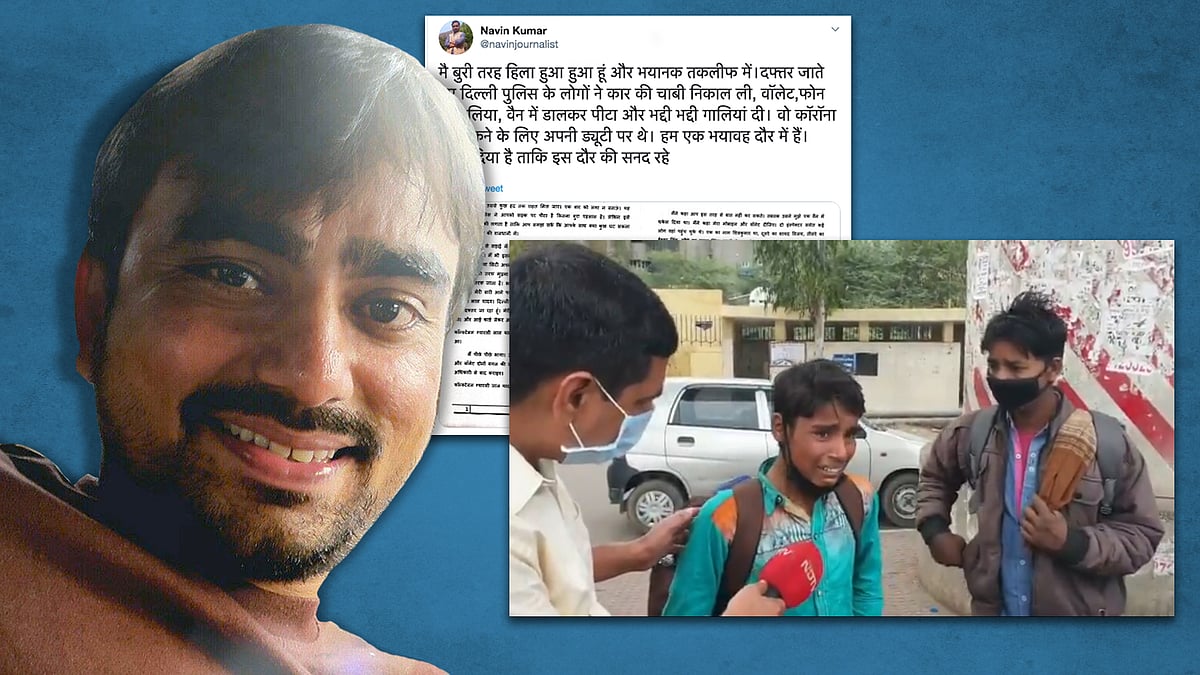Day 1 of lockdown: Confusion caused by Modi’s speech disrupts essential services
Some online grocers and retailers suspended services, while neighbourhood stores complained of authorities disrupting supplies.
Prime Minister Narendra Modi’s failure to lay it out clearly in his speech last night that essential services would not be affected by the three-week nationwide lockdown caused much disruption today.
Online grocers and retailers such as Big Basket, Grofers, Amazon, and Flipkart had to suspend delivery services, partially or fully. At some places, services were disrupted because local authorities misinterpreted the lockdown guidelines. While repeatedly emphasising that people mustn’t leave their homes, Modi did not specify in his speech that services providing food items, groceries, vegetables, medicines, and such would not be affected.
As a consequence, people in several parts of the country immediately crowded shops, looking to stock up for the extended lockdown.
Confusion over lockdown norms continued on Wednesday.
Albinder Dhindsa, CEO of Grofers, tweeted that the local authorities had closed their warehouse in Faridabad and asked for help to “sort this out”.
Subsequently, the online grocer said they were working with the authorities to resume delivery operations soon.
Big Basket suspended its operations entirely, as did Flipkart.
Big Basket said they couldn’t operate due to restrictions imposed by local authorities on the movement of goods.
In a statement to IANS, Rajneesh Kumar, chief corporate affairs officer at Flipkart, said, “Flipkart has temporarily suspended orders as we assess the possibilities of operating in the lockdown. We are prioritising the safety of our delivery executives and seeking the support of the local governments and police authorities to meet the needs of our customers as they stay home during this lockdown.”
Big Bazaar, however, will continue its doorstep delivery in select areas. In a series of tweets, the company shared a list of phone numbers for outlets where customers can call or place their orders through WhatsApp.
It wasn’t just online delivery services that were affected. In some places, neighbourhood shops that are exempted from the lockdown complained that the police were disrupting the supply of essential goods. “They’re saying people will get every essential service during these 21 days,” Faheem, a shopkeeper in Batla House, Delhi, told Newslaundry. “But when the goods aren’t able to reach us, how can we provide for the people and ourselves?”
According to surveys by community platform Local Circles, the problem of the unavailability of essential goods, online and off, is worsening. Between March 20 and 22, around 35 percent of the customers who participated in the survey were unable to buy essential goods through ecommerce services. The number jumped up to 79 percent between March 23 and 24. Similarly, 17 percent of those surveyed couldn’t buy basic goods at retail stores between March 20 and 22, with the figure rising to 32 percent between March 23 and 24.
Meanwhile, as India settled in for a long lockdown, the number of confirmed coronavirus infections increased to 562, with nine deaths, according to the Ministry of Health and Family Welfare. On Wednesday, five people admitted in hospitals across Madhya Pradesh tested positive, taking the total to nine. Mizoram got its second confirmed case. Four new positive cases were reported from Rajasthan as well, taking the state’s total to 32. Maharashtra, with 122, has reported the most coronavirus cases so far, followed by Kerala with 105.
Ramping up its testing capacity, Tamil Nadu set up its 8th testing lab for coronavirus at a government hospital in Madurai. The Indian Council of Medical Research said on Sunday it had approved 114 labs for coronavirus testing. Of these, 87 labs are functional and 27 are in the process of being operationalised. According to the Financial Times, fewer than 17,000 people had been tested in India as of March 22.
The central home ministry invoked the National Disaster Management Act for the first time. It said the virus was a “threat” to the country and the National Disaster Management Authority “considered it necessary to take effective measures”. The 2005 law, as the Hindustan Times explained, makes the NDMA the nodal agency for “coordinating with the states to contain the pandemic, ensure uniform disaster management plans, and provide relief funds for disaster management”.
The law also empowers the central government to take action against anyone obstructing implementation of national plans, including government officials. It provides for a jail term and a fine or both for offences such as “false warning” and “misappropriation of money and materials”.
Panic buying
On Tuesday night, Modi’s speech had led to crowds thronging shops and ATMs.
“What the prime minister announced was a good step towards slowing the virus down, but I feel there was a sense of mistrust which contributed to panic buying,” said Sairah Syed, a private school teacher in Noida who saw her neighbourhood market get instantly crowded. “All I’m saying is that the availability of essential commodities should’ve been mentioned clearly in the speech. At that moment, nobody checked Twitter to see what was going to remain open and what wasn’t.”
An hour after his speech, Modi sent out a tweet urging the public to remain calm and clarifying that essential services would not be affected during the lockdown.
After the speech, the home ministry also published a list of services that would not be affected. The ministry also asked the states to dispel rumors about shortages of essential commodities.
Reacting to the lockdown, politician Prashant Kishor said it was a “bit too long” and criticised the government for its “shaky preparedness” to deal with the coronavirus crisis.
Former finance minister P Chidambaram of the Congress described the lockdown as a “watershed moment”. Modi was the commander in India’s battle against the virus, he added, and the people “foot soldiers”.
Chidambaram also suggested a 10-point plan that includes depositing money in the bank accounts of the poor and the marginalised, including farmers and labourers, and cutting GST rates by 5 percent for all essential goods and services from April 1 to June 30.
One of the prominent people who didn’t pay heed to the prime minister’s appeals for social distancing was Uttar Pradesh Chief Minister Adityananth, who was seen attending an early morning ritual in Ayodhya city to shift the idol of Lord Ram from a tin shed to another structure made of fibre until the Ram Mandir is constructed. He described the ritual as the first phase of the construction of the Ram Mandir.
There had been speculation that the event would be deferred owing to the pandemic, but the chief minister went ahead.
The ritual was attended by 20 people, according to NDTV. Afterwards, the chief minister urged the public to follow the lockdown guidelines.
 Can newspapers survive the coronavirus fallout?
Can newspapers survive the coronavirus fallout? Attacks on journalists, migrant workers struggling to go home: India’s lockdown is taking a toll
Attacks on journalists, migrant workers struggling to go home: India’s lockdown is taking a toll